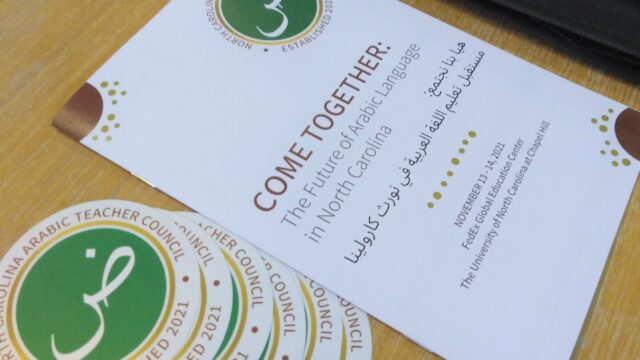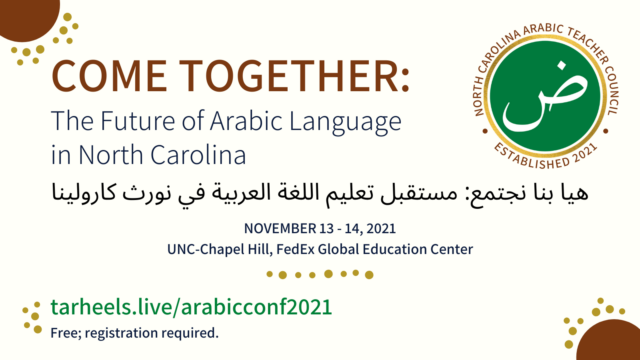Arabic greetings of marhaba (hello), sabah al kheir (good morning), and ahlan wa sahlan (welcome) were shared as attendees gathered for the inaugural conference of the emerging North Carolina Arabic Teacher Council (NCATC), November 13-14, 2021. “Come Together: The Future of Arabic Language in North Carolina” was held at UNC-Chapel Hill and convened over 30 educators and administrators from K-16 institutions across North Carolina. The event also served as the annual conference of the Duke-UNC Consortium for Middle East Studies, composed of the UNC Center for Middle East and Islamic Studies and the Duke University Middle East Studies Center.
Educators working to expand Arabic as a world language offering for NC students traveled from Asheville, Fayetteville, Charlotte and beyond and represented 18 programs from K-12 schools, community colleges, universities, community language programs, and the military. The conference featured content sessions, networking, and preliminary meetings to organize the NCATC.
Creative Approaches to Arabic Language Learning
Dr. Ann Marie Gunter, world languages consultant for the North Carolina Department of Public Instruction, offered welcoming remarks to begin the conference on Nov. 13. “Arabic is currently ranked as the ninth language in student enrollment across the state,” Dr. Gunter said. “I challenge you to consider how Arabic language student enrollment could grow by the years 2026 and 2031.”

In concurrent sessions, educators discussed ways in which they can use virtual instruction techniques developed during the pandemic for in-person teaching environments. Sessions presented by faculty at institutions across North Carolina featured topics such as “Creatively Overcoming Challenges in the Arabic Classroom,” “New Perspectives in Teaching Al-Kitaab,” “Creative Arts Techniques for the K-12 Classroom: Incorporating Song, Poetry, Play and Yoga!,” and “Best Practices in Teaching Arabic at the K-12 Level.” Attendees were able to select sessions that best aligned with the grade levels they teach (either a K-12 focus, or a higher education-focus).
Renowned in the Arabic-teaching community for his creative teaching approaches, Fadi Abughoush, a Chicago high school teacher at Lindblom Math & Science Academy, engaged attendees in a virtual keynote presentation entitled “Technology to Make Learning Fun and Inspire Connections to the Arab World.” Many attendees noted the value of technological tools that Abughoush described, like Flipgrid, to creatively engage Arabic language learners.
Saturday’s events ended with a performance by the North Carolina Middle Eastern Music Ensemble, a group passionate about preserving the musical art of the Middle East. In a lively performance, the ensemble performed folk classes ranging from Egypt to Turkey to Libya. The event exemplified how music and culture are an important aspect of language learning.

North Carolina Arabic Teacher Council
As Arabic is a less-commonly taught language, Arabic teachers face unique challenges and are typically under-represented in world language conferences. In response to this, a handful of regional Arabic Teacher Councils have emerged across the country in recent years. Supported by the Duke-UNC Consortium for Middle East Studies, the NCATC is the first group in North Carolina to specifically serve the needs of Arabic teachers.
“While we’ve all worked diligently over the years to create novel resources and curricula for our students, our efforts have been siloed and less collaborative,” said Caroline Robinson, assistant teaching professor of Arabic at UNC-Chapel Hill and conference co-convener. “A primary goal of the NCATC is to unite educators and streamline efforts to build strong, consistent, and aligned Arabic programs from the elementary to the university classroom.”
Nov. 14 sessions were dedicated to discussions about the structure and advisory board of the NCATC, which will coordinate annual professional development opportunities and provide communication channels to other teachers and opportunities across the country. Attendees agreed upon the structure and vision of the NCATC and voted in an advisory council of members to guide NCATC programs.
Building Connections

As the first event of the NCATC, a primary goal of the conference was to generate community among Arabic language teachers. The schedule included time for facilitated discussion among attendees in small groups to share their teaching resources, ideas, and challenges. Many teachers from around the state had the opportunity to meet their colleagues for the first time.
To connect Arabic language educators with local community partners, catering at the event featured a variety of local Arab businesses, including Samia’s Cuisine for a Cause (Moroccan), Triangle Syrian Catering, and Mediterranean Deli.
The conference successfully convened Arabic language educators across the state and provided quality professional development. “We are overwhelmed at the warmth and immediacy of connection found among NC Arabic language educators and are now united as a council to begin the work of building Arabic language programs that will produce lifelong Arabic language students, Inshallah,” said Robinson.
This conference was made possible by the Duke-UNC Consortium for Middle East Studies through a Title VI grant from the U.S. Department of Education and the UNC College of Arts & Sciences. As the recipient of a Title VI Middle East Studies grant from the U.S. Department of Education, the Consortium is a National Resource Center and supports faculty, students, K-12 and community college teachers, and the general public in deepening understanding of the Middle East and North Africa.

